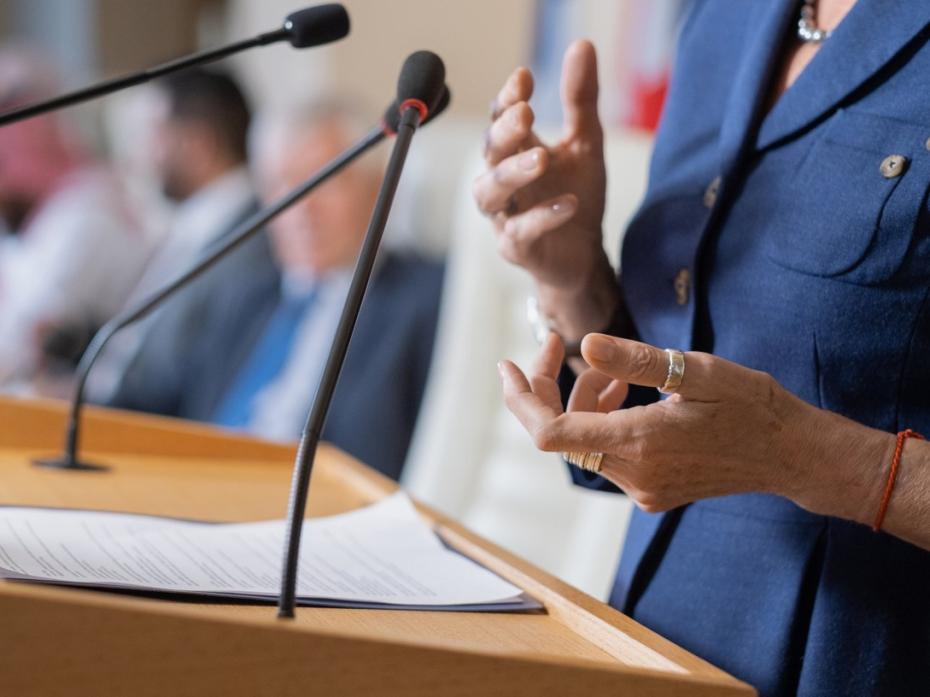
‘It falls to us to tell our universities’ stories. Here’s how’
There has been little mention of higher education during the UK general election campaign, so it falls to university leaders to make sure their stories are heard, writes Jane Harrington
There’s nothing like a general election to focus the mind.
Since the announcement that the election would be held on 4 July, we have heard only a little from politicians about higher education, with individual universities and sector groups lobbying to influence current and potential decision-makers.
When the Conservatives gave us one of the few higher education headlines of the campaign, with their vow to scrap “Mickey Mouse degrees”, universities fought back, highlighting their role in creative industries worth £108 billion to the UK and the fact that international students added £21.7 billion to UK exports in 2021. They also pointed to the soft power universities generate – a great example of this is the Emperor of Japan, who is visiting the UK this week and who studied at an English university.
It is perhaps surprising that there has not been more public discussion about our sector, given the size of the challenges we are facing and the potential impact they may have across communities. So it falls to us to tell our stories.
- Election special: find out how higher education can make its case amid political change
- THE podcast: what does the UK election mean for higher education?
- Resources offering advice on how to promote your research for greater impact
Know your university’s key stakeholders
Building relationships takes time. Identify and engage with your key stakeholders in ways that work for them. Regularly meet with your local and regional politicians, so not just MPs but also local or parish councillors, and do not limit yourself to talking only to those who represent the party currently in power.
Take the time to understand them, the context they work in, their motivations and their challenges so you can build stronger local and regional partnerships. And do this on an ongoing basis.
When the government-commissioned report on the UK graduate route from the Migration Advisory Committee (MAC) was published, we already had connections to our MPs, chambers of commerce and partners in a wide range of sectors. We knew who to turn to quickly for help, and, in turn, they knew that our concerns were serious.
Gather the facts that support your story
Once you know who your key stakeholders are, you need to have an established evidence base to support the story that you want to tell. Identify “why you” and why does the problem that you have matter to them.
Be ready to clearly articulate your contribution and your university’s value. At the University of Greenwich, we commissioned a report that plainly sets out our impact on our local areas. The most striking statistic for me was that for every £1 spent, we generate £5.50. But we won’t be unique in that – as diverse as our brilliant sector is, one thing we have in common is that every institution gives more than it takes.
We worked with our alumni team to identify the human stories behind the statistics. We use these to ensure that our stakeholders understand our impact and our value and can relate to what we are telling them.
You can draw on other sources of factual information for advocating. When we were working around the MAC review in Greenwich, in addition to our own internal information, we used reports prepared by Universities UK (UUK), polling from Public First and material from other organisations to make the case for international students in a letter to the chancellor of the Exchequer.
We also had a clear ask, which could be conveyed in a letter to ministers, via joint statements, or in a request for a question to be raised in the Houses of Parliament.
Collaborate with others in higher education and beyond
This year, as well as being vice-chancellor of the University of Greenwich, I am also chair of the University Alliance (UA). As University Alliance, we are part of a brilliant community in higher education, and with our other sector groups – UUK, the Russell Group, London Higher – we meet ministers and civil servants all year round to share the excellent work universities do and to lobby on their behalf.
Universities can work with these sector groups. For instance, contribute a local case study to their regular campaigns and public affairs activity; by doing so, you will elevate your work to a new audience.
Journalists can help give you profile. Your communications team works closely with local and national reporters, so they will know the best people to talk to and what the audiences they serve are interested in. That could be anything from your take on local issues to research that shifts the dial nationally.
And do not forget your networks closer to home: local partners, staff, alumni and even students can be your advocates.
Remember, this is an ongoing conversation
Effective stakeholder engagement cannot be a one-off. As a sector, we tend to be less comfortable advocating for ourselves on a day-to-day basis; it can feel like nobody’s listening. But by telling our stories consistently, we build trust and credibility. We gain the respect to have a stronger voice.
So whoever ends up occupying No 10 on 5 July, we all have a job to do, locally, regionally and nationally, to make our case for change and to support the trailblazing sector we are lucky to work within.
Jane Harrington is vice-chancellor and chief executive officer at the University of Greenwich and chair of the University Alliance.
If you would like advice and insight from academics and university staff delivered direct to your inbox each week, sign up for the Campus newsletter.


